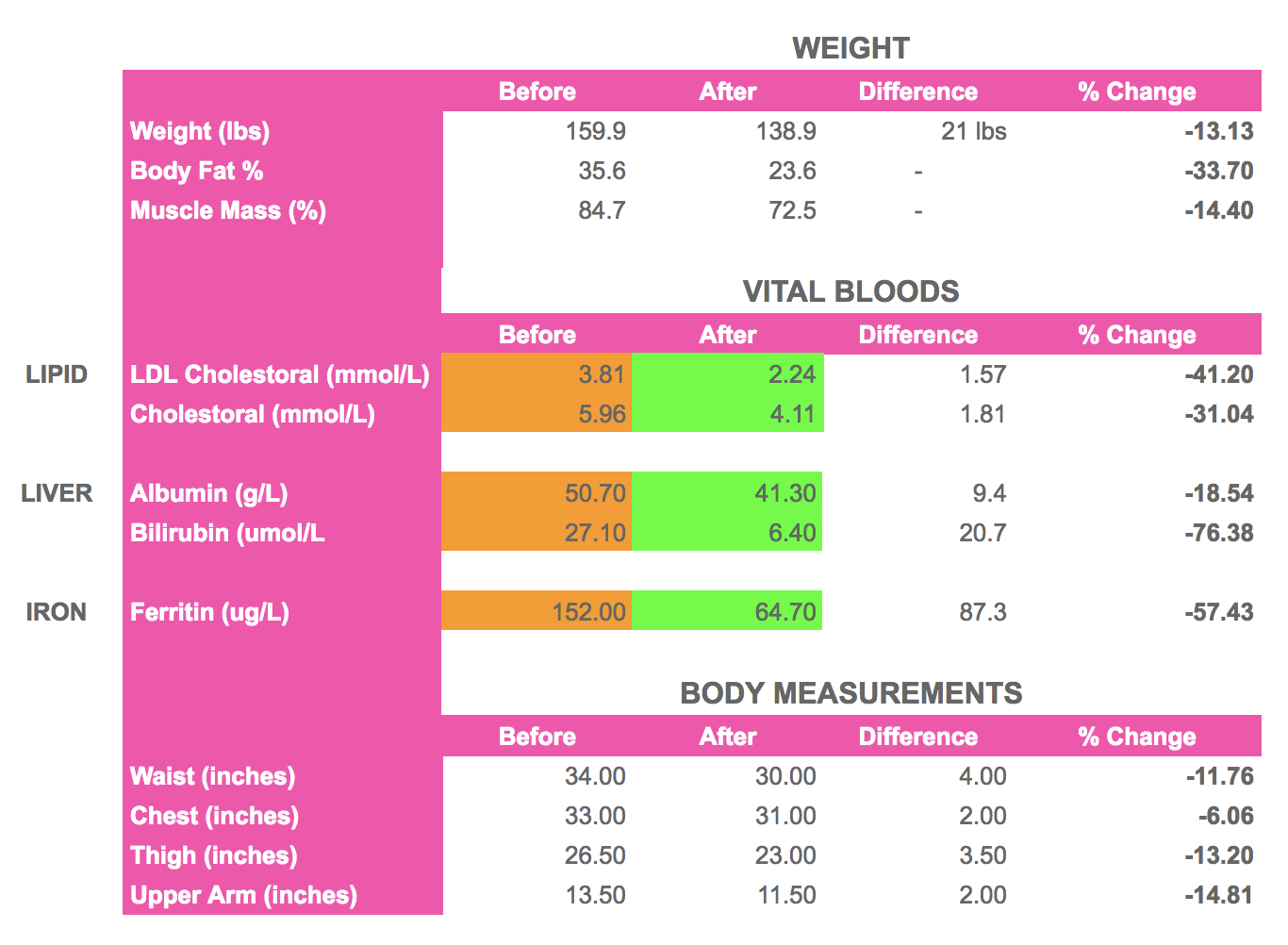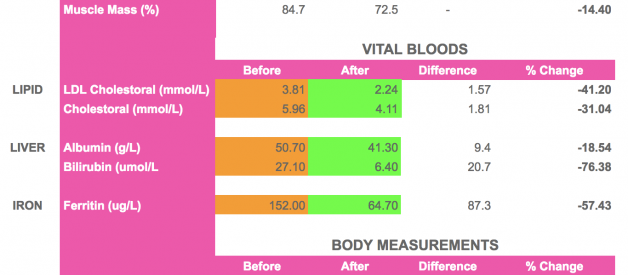Last year, I was trying to come up with novel ways to raise money for MacMillan Cancer who were a huge help to our family when my dad became terminally ill with a rare form of lung cancer. I was conscious of how desensitised I had become by the sheer volume of charitable requests on my facebook feed and figured I?d have to come up with something radical to make my plea for donations stand out.
Already aware of the growing trend in intermittent fasting for weight loss, I began to wonder what would happen to my body if I did not eat anything for a prolonged period of time. The more I researched extended water fasting, the more excited I became about its potential to help me raise money and benefit my overall health at the same time.
Choosing a goal
First I had to settle on a duration to aim for. While most fasting practitioners recommend fasts between 5 and 14 days, I found some detailed accounts of people who had fasted for as long as 45 days and lived to tell the tale. I had a holiday booked and did not want to ruin it so I settled on 22 days as this felt long enough to get some meaningful data. I always think the measure of a goal is how intimidated you feel at the thought of achieving it and this scared the shit out of me so I knew it was ambitious enough.
Silencing the naysayers
My initial enthusiasm was quickly quashed by well meaning colleagues, friends and family members who tried to talk me out of taking on such a radical challenge.
?Nobody can survive that long without food?
?You?ll do irreparable damage to your body?
?You won?t be able to work?
By the time I started discussing my plans with other people, I?d done enough research to reassure myself that none of these doomsday prophecies were likely to materialise. Moreover, I trusted that my body would send me warning signals I was heading towards danger at any point.
Frustrated that water fasting seemed to have such a bad rep I decided to take pre- and post-fast blood tests that would prove unequivocally that I was not permanently damaging my health. This made it easier to field the daily onslaught of concern as I was able to deflect futile debate by reminding people that the results of my post-fast tests would settle the argument once and for all.
Monitoring progress
I know from experience that doing any kind of ?diet? is close to impossible for me if I am not closely tracking my progress. I was also fascinated by the plethora of claims made about the impact of fasting so I decided to track as much of my experience as possible to motivate myself and help others who consider embarking on a similar journey.
Metrics to track
There are many parameters you could track and the extent to which you engage with this depends on how inquisitive you are and how much (if anything) you want to spend. I?m very health conscious anyway so I decided to go for the following:
- Blood Vitals (cholesterol, liver function, iron, vitamin D)
- Ketones
- pH Balance
- Body Measurements
- Weight
- Body Fat %
- Muscle Mass %
- Body Water %
To avoid pestering my GP, I arranged my own blood tests immediately before and after the fast through home health testing startup Thriva.
I weighed myself using my Withings Bodi Cardio scales every 7 days.
I measured ketones and pH balance daily using urine test strips to ensure I remained within healthy ranges.
I took body measurements and pictures of my progress every 7 days.
Defining rules for the fast
Many purists in the fasting community (yes, that is a thing) will claim that you are not doing it properly unless you drink only filtered water for the duration of the fast. That seemed like a lot of hassle to me and I was not convinced that it would make a big difference so I chose to ignore it. Instead, I decided to allow myself herbal teas and 4tbs of Braggs Organic Apple Cider Vinegar each day. The latter is highly regarded by many fasters as it?s packed with vitamins, minerals and enzymes that help to control your body?s pH levels.
Before you start
There are lots of excellent and very detailed resources about how best to prepare for an extended water fast (see ?Further Reading? at the end of this post) so I won?t bore you with the detail here. I did not prepare at all as I already restricted my sugar and carbohydrate intake. If you do eat a lot of junk it may be an idea to start with a low sugar/carb diet for a couple of weeks to reduce the withdrawals and minimise the risk of keto flu which is extremely unpleasant. If you have any pre-existing medical conditions whatsoever you should definitely consult your GP before you fast for any period of time.
Fasting while living a normal life
I?m not a doctor or fasting expert so I?m not here to make claims about what is right and wrong. I can only share my own experience and it?s up to you how you interpret the results.
A lot of blogs I read recommended getting as much rest as possible and ideally, taking some time off work. This just was not an option for me so I decided to do my fast while going about my normal daily life.
That means working 12+ hour days, 22km round-trip commutes on my bike and continuing to work out in the gym 2?3 times per week. I did reduce cardio intensity to ease the pressure on my heart but was able to lift as much weight as before without noticing much difference in form for the duration of the fast.
During the fast
Fasting is insanely hard but it does get a lot easier as your body adjusts to the new ?normal?.
During the first three days I felt like I could have fallen off the wagon at any time. The smell of food drove me wild and I started to obsess about all the things I would devour as soon as I could eat again. By the third day I was in full ketosis and experienced pounding headaches, disturbed sleep and felt light headed when standing up too quickly.
At the two week mark, the uncontrollable hunger pangs and headaches were completely gone. My blood pressure was still lower than usual which explains why I felt light-headed and freezing cold at times. I was able to handle and cook food for my boyfriend without feeling tempted and found the smell of junk and sugar laden snacks repulsive.
Week three was surprisingly easy compared to weeks one and two. I suspect this is due to the body adjusting to the new ?normal? and the fact that I had purged most of the toxins in my system at this point which is said to significantly reduce unpleasant and flu-like side effects.
The results (drum roll please?)
Physically and mentally, I felt in the shape of my life.
Don?t believe me? Let?s take a look at the data:
 Summary of key metrics tracked during my fast
Summary of key metrics tracked during my fast
As you can see, the results are astonishing. Far from causing irreparable damage to my health, my extended fast had a profound impact on my vital health stats.
The values highlighted in orange were classified as suboptimal by the good doctors at Thriva. That is to say that while I was not in immediate danger, my pre-fast test results indicated abnormalities that were a cause for concern.
The values highlighted in green indicate a return to ?healthy? levels in the areas where results were previously in the unhealthy range. Most notably, my liver function and cholesterol bounced right back to well within the healthy zone.
Naturally, I expected to lose weight on a diet of water and herbal tea but I never expected such wide-ranging improvements across the board.
What I learned
I embarked on this journey believing that the only positive side effects would be weight loss + money raised for charity. I was wrong!
Extended fasting is ultimately a test of determination, will power and grit. Completing such a tough personal challenge did not only improve my physical wellbeing but also boosted my self belief and fine tuned my self awareness.
I now believe that the ?3 meals per day? lifestyle we have all become used to is nothing more than a social construct. Our hunter gatherer forefathers did not have the luxury of cornflakes on waking followed by a Boots meal deal at lunch and deliveroo for dinner. I no longer think we ?need? this either.
6 months on from breaking my fast, I have managed to maintain my post-fast weight (with the exception of a small amount of water gain). I fast intermittently each day (no food between 9pm and noon the following day) which helps me achieve razor sharp focus on difficult tasks first thing in the morning. I try to avoid refined carbohydrates and sugar in favour of complex carbs, healthy fats and proteins.
Above all, I trust my body to let me know when it?s time to eat.
*** Show Your Support For Macmillan Cancer ***
If you appreciate the time and effort it has taken to conduct this ?experiment? why not make a small donation to my favourite charity?
You can donate and learn more about this cause on my JustGiving Page
Further Reading:
A guide to water fasting: https://www.natural-health-zone.com/water-fasting.html
Is fasting the secret to longer life: http://www.menshealth.co.uk/food-nutrition/does-fasting-make-you-live-longer
Water fasting benefits and dangers: https://www.healthline.com/nutrition/water-fasting
Thanks for reading!
If you found this essay insightful, I?d massively appreciate you recommending to friends and colleagues.
Really good read? Share the ? on Twitter!
Follow me here: https://twitter.com/realkniels
Want to see more essays like this?
I?ve teamed up with a data scientist to help me dig even deeper on my next fast.


